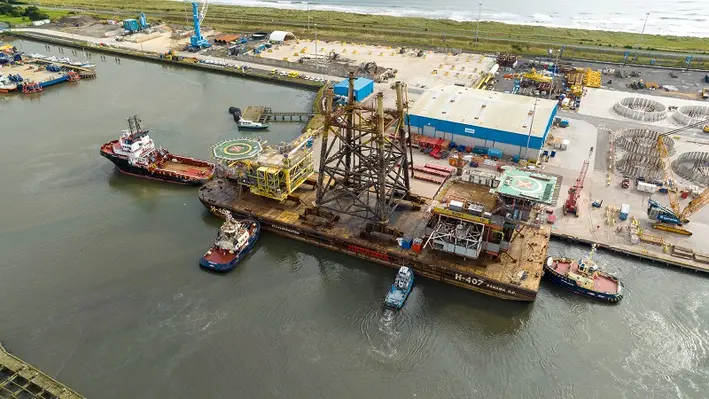

The Port of Blyth, locate between Aberdeen and Great Yarmouth in the UK, working together with Thompsons of Prudhoe, has welcomed 7,000 tonnes of offshore infrastructure to be decommissioned.
Several topsides and jackets for three North Sea offshore oil and gas platforms were delivered to the port’s Battleship Wharf, home to its unique decommissioning facility that is operated in partnership with Thompsons of Prudhoe.
Following arrival, the assets have been successfully removes from two barges and transferred to the decommissioning facility using SPMTs. Here, they were set down onto purpose-built stools ready for demolition. These actions required a number of key contractors such as Mammoet which assisted in the SPTM operations and Harlyn Solutions which provided design and engineering works during the load out. According to the companies, the delivery of the assets is a testament to the advanced handling capabilities boasted by the port as it required exceptional planning and coordination.
Tom Koerner, Operations Director of Thompsons of Prudhoe, remarked, “We are delighted to be given the opportunity to decommission these assets on behalf of our client. This project gives us a strong platform to demonstrate and promote our capabilities to the offshore industry for all future onshore dismantling and waste disposal requirements.”
With the safe delivery successfully completed, Thompsons of Prudhoe will now progress with structural inspection, surveys and make-safe ahead of demolition (which will be carried out by mechanical means and lifting operation). The waste from the assets will be sorted, segregated and (for much of it) recycled.
Martin Lawlor, Chief Executive at Port of Blyth, commented, “By combining the port’s offshore energy cargo-related handling capabilities with Thompsons of Prudhoe’s decommissioning and demolition expertise, customers are able to rely on first-class service based on quality, safety, and performance. We have now established a great track record of successful high-profile decommissioning projects and are looking forward to supporting further decommissioning projects across the offshore energy sector.”
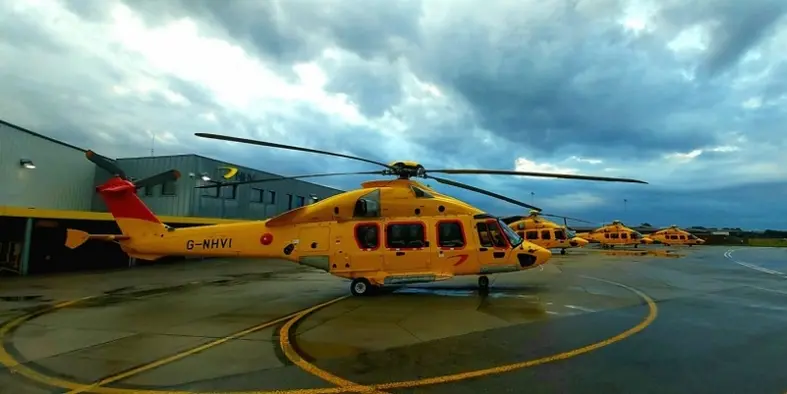

NHV Helicopters, a Belgium-based provider of helicopter services for the offshore industry, has been awarded a contract by Well-Safe Guardian on behalf of Repsol Sinopec Resources UK (RSRUK) to support well abandonment operations on the Buchan Field, central North Sea.
NHV specialises in B-to-B helicopter services and boasts a strong geographic presence in Europe and western Australia. For this contract in the North Sea, NHV will provide approximately four flights per week from the Aberdeen base to the Buchan Field to facilitate seamless connectivity to the project site. The company will utilise its H175 helicopters as it carries out the contract which is due to commence in mid-September 2023.
Jamie John, Commercial Director of North Sea Energy at NHV Group, remarked, “Securing this recent contract with Well-Safe Solutions will play a pivotal role in supporting the Buchan well abandonment operations. NHV has invested a lot into the energy industry and this contract is testament to our teams drive and level of service. Our top-tier fleet, including the advanced H175 model, coupled with our experienced crew, positions us well to meet the demands of this critical phase of operations.”
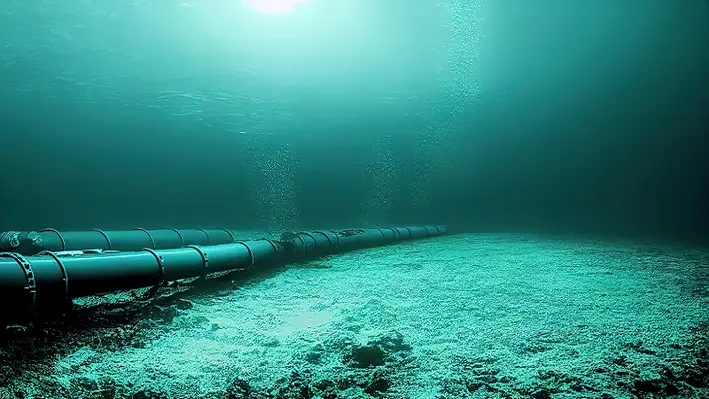

Perenco and Carbon Catalyst Limited (CCL) have been awarded a licence to progress the Poseidon carbon capture and storage (CCS) project following the conclusion of the first competitive carbon storage licence round of the North Sea Transition Authority (NTSA).
The project encompasses the Leman gas fields, one of the largest geological structures in the southern North Sea sector of the UK Continental Shelf (UKCS) and offers depleted gas reservoirs alongside saline aquifers to permanently store recovered CO2.
According to the companies, the project has the potential to significant decarbonise the East and Southeast of England when it comes online (expected 2029). Leman is connected via pipeline to the Bacton Terminal which will be utilised to receive and process CO2 from various onshore sources. This will then be sent to be injected offshore into reservoir rocks. Initial injection rates will be around 1.5mn tonnes per annum (Mtpa) and could ramp up to 40Mtpa across a 40-year period.
With the licence awarded, the project will now move into further detailed appraisal of storage sites with work commencing to bring the concept to delivery alongside mid-stream and up-stream partners.
Jo White, General Manager Perenco UK, remarked, “This is a fantastic opportunity to leverage Perenco UK’s deep experience of gas operations by developing a project that will help to support the UK’s energy transition, generate highly skilled jobs locally and nationally, and actively facilitate the government’s net-zero targets. We look forward to working with all stakeholders to deliver this strategic project.”
Henry Morris, Executive Director at Carbon Catalyst, added, “Poseidon has the potential to make a very material contribution to the decarbonisation of the UK economy by storing up to 40mn tonnes of CO2 per year into the giant depleted Leman gas field and overlying aquifer system. CCL is looking forward to supporting Perenco as they progress through the appraisal period towards final investment decision, with the ultimate goal of achieving first CO2 injection by 2029.”
Onwards with Orion
In addition to the Poseidon project, the partners have also announced that they have been awarded two further carbon storage licences to progress the Orion CCS project, designed to deliver an initial injection capacity of 1Mtpa.
The project encompasses the decommissioned Amethyst field as well as the West Sole field (currently producing). It will use depleted gas reservoirs for permanent storage. Injection is expected to commence in 2031 and could rise to 6Mtpa.
Perenco, which owns and operates significant gas infrastructure in the Humberside area will evaluate the possibility of reusing existing assets such as Dimlington Terminal for the project.
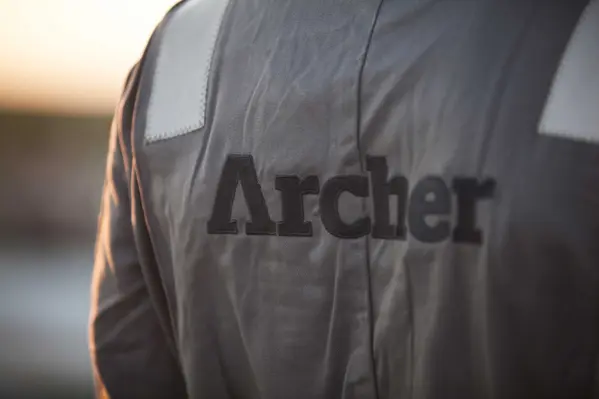
 Archer has been awarded a US$165mn decommissioning contract by Repsol Sinopec Resources UK Ltd. for the execution of plug and abandonment (P&A) services in the Fulmar and Halley Fields in the North Sea.
Archer has been awarded a US$165mn decommissioning contract by Repsol Sinopec Resources UK Ltd. for the execution of plug and abandonment (P&A) services in the Fulmar and Halley Fields in the North Sea.
The awarded contract is for a fully integrated P&A project, covering the complete work scope and services of the 30 Fulmar Field wells and the two Halley Field wells.
The Fulmar scope includes the removal of the existing drilling facility and the installation of Archer’s P&A rigs, as well as its full P&A well services offering to reduce time and cost. The work will be carried out using leading digital solutions in collaboration with the company’s partners, and operations are expected to commence in H2 2024.
Dag Skindlo, CEO of Archer, said, “We are delighted that Repsol Sinopec has elected Archer and our fully integrated operational model for this P&A project. The delivery model with integrated drilling and well services, supported by partners, is a step change in how operators permanently plug and abandon oil and gas wells. Archer has worked strategically over several years to develop this fully integrated model and we are excited that Repsol Sinopec has chosen Archer as its partner.
“The permanent plugging and abandonment of oil and gas wells is an essential activity as the world decarbonises on the road to net-zero. Our goal is to industrialise the P&A process and spearhead innovation to cut operators’ P&A costs globally.”
Adam Sheikh, Repsol Sinopec’s VP of Decommissioning and Energy Transition, commented, “We aim to deliver one of the North Sea’s most ambitious decommissioning programmes in the years ahead – including the full decommissioning of our Fulmar Alpha Asset. This contract award represents a significant milestone in our decommissioning journey and my thanks go to the teams for the vast amount of work to get us to this stage. We look forward to working closely with our partner Archer to safely deliver this decommissioning scope of works on our Fulmar Alpha facility."
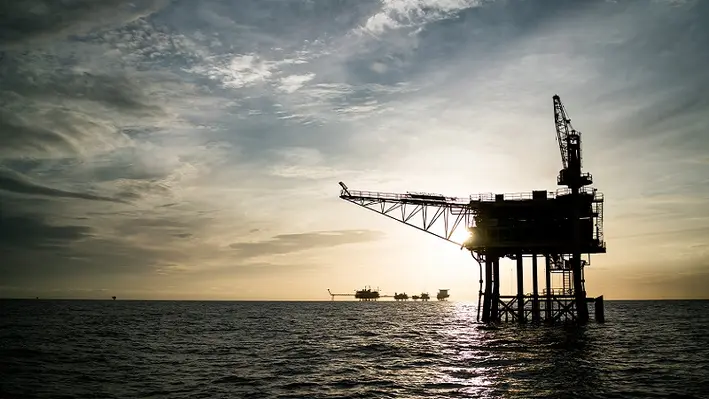

According to new research by the North Sea Transition Authority (NSTA), the oil and gas industry in the North Sea spent UK£1.6bn on decommissioning redundant wells and infrastructure last year.
This figure is more than any in the previous five years with UK£8bn spent accumulatively between 2017 and 2022 and will remain high for the years ahead, with UK£2bn expected to be spent per year in the next decade. Of the work associated with the UK North Sea alone, UK suppliers are forecast to take the lion’s share at 70%.
The NSTA was pleased to indicate that the sector appears to be living up to its North Sea Transition Deal Pledge to ensure at least half of decommissioning spending goes to the UK supply chain and that it is meeting legal obligations to clean and remove infrastructure once production ceases. It continued that the industry has now built an impressive track record of carrying out decommissioning projects cost-efficiently and safely due to its willingness to share learnings and date. It is also embracing new technologies' commercial models.
Emerging challenges in recent years – such as a heightening demand for equipment, vessels and services from other regions and sectors – has led to an estimated total decommissioning cost of around UK£40bn that must be footed in the years ahead. However, the NSTA has stated it is confident the industry can overcome associated hurdles, meet cost-efficiency targets and ultimately lower the estimate to around UK£33.3bn by the end of 2028.
To support this, the NSTA is providing ongoing support by introducing new key performance indicators and benchmarks to provide a more complete picture of how well decommissioning projects are being planned and executed. This will help to identify opportunities for industry stakeholders to improve performance and realise further cost-efficiencies.
Pauline Innes, NSTA Director of Supply Chain and Decommissioning, remarked, “The North Sea decommissioning sector is highly active and productive, and the industry is ideally placed to realise the massive UK£21bn opportunity which will come its way over the next 10 years.
“However, operators must redouble their commitment to collaborate with the supply chain and plan even more effectively if they are to overcome challenging market conditions and remain competitive on cost. The NSTA will continue to use its powers and influence to support the industry as it strives for continuous improvement, including through the development of new benchmarks.”
Bob Fennell, DaRT Co-Chair and North Sea Executive Vice President at Harbour Energy, added, “It is critical that North Sea operators work together to ensure that oil and gas assets which, at the end of their production life, cannot be repurposed to support new technologies like carbon capture and storage, are decommissioned safely and in the most cost-effective manner. Collaborating and sharing data is an important first step to providing the supply chain with the visibility and confidence they require to meet UK demand for such works in a timely and cost-competitive way.”
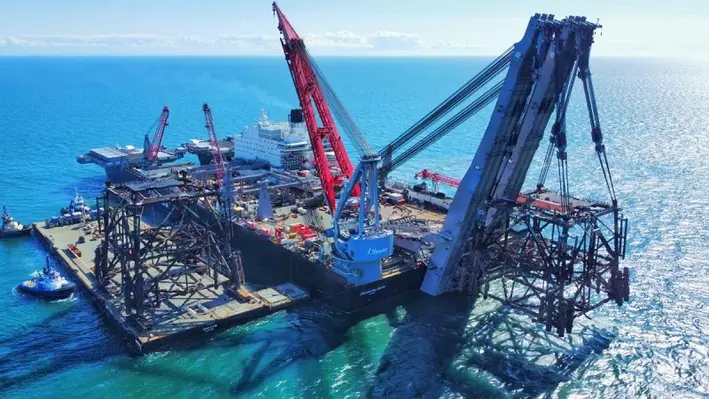

Spirit Energy is celebrating its busiest-year-to-date in regards to decommissioning activities across the Central North Sea (CNS), Southern North Sea (SNS) and East Irish Sea.
Some of the recent work to complete includes the final phase of the campaign to remove the DP3 and DP4 installations in the Morecambe Bay development. Allseas completed the work through the use of Pioneering Spirit, the largest and most versatile offshore construction vessel in the world which is capable of lifting entire topsides of up to 48,000 t and jackets up to 20,000 t in a single piece. For this project in the East Irish Sea, a total of 9,000 t of jacket structures were removed in tandem using the jacket lift system and loaded directly onto the Iron lady. It was then to be transferred to Fife for recycling.
In CNS, a 14 well plug and abandonment campaign is being executed from the Well-Safe Defender vessel across four fields: Chestnut, Birch, Larch and Sycamore. Chestnnut’s decommissioning has now been completed.
“The Chestnut campaign has been delivered with exemplary safety and operational performance; this was our ultimate aim when we set out to select our partners for the CNS abandonment campaign. With this first milestone achieved we look forward to the remainder of the campaign,” remarked Nicholas Riley, Well Operations Manager, Spirit Energy.
Meanwhile, in SNS, Heerema Marine Contractors has successfully removed three topsides and three jackets with SSCV Thialf crane vessel. DeepOcean are set to recover subsea infrastructure from six assets later this year. The recycling of the all the structures will be conducted by Thompsons of Prudhoe in the Port of Blyth.
Head of Decommissioning and projects at Spirit Energy, Donald Martin, commented, “Combining decommissioning programmes and supply chain opportunities at portfolio level has created significant economies of scale with our partners leveraging the capability of their assets. This has also helped create opportunities to share campaign management responsibilities, leading to a lean and agile team. The recent successful completion of the removals of the DP3 and DP4 jackets marks a significant milestone towards our longer-term transition plan for the Morecambe hub being converted into a world-class carbon storage cluster.”
Spirit Energy, CEO, Neil McCulloch, concluded, “We are very proud of our efforts and achievements in decommissioning carried out by a first-class team of Spirit employees working collaboratively with the supply chain. Our team has thought strategically and formed long-term, high-value and high-trust relationships with our supply chain partners and we are very pleased to have achieved such a high level of local content and repeat business with UK and Netherlands based firms where our core business lies. Of course, we are also pleased to continually deliver industry leading decommissioning cost performance in line with our stewardship obligations from our regulators.”
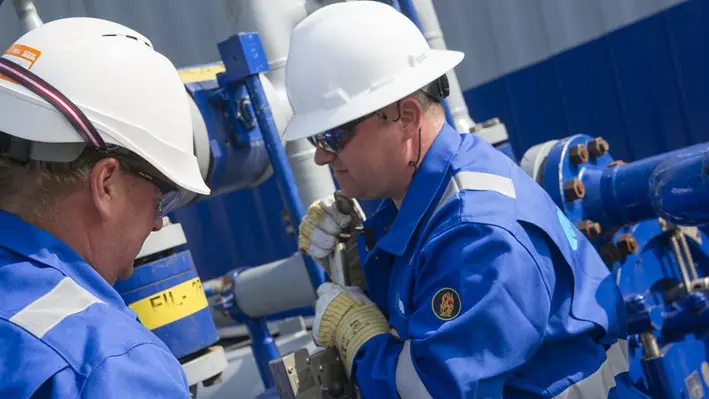
 WSG has announced it has sold its well intervention division and will use the funds to lay the foundation for a period of international expansion for the rebranded WSG Energy Services (WSGES).
WSG has announced it has sold its well intervention division and will use the funds to lay the foundation for a period of international expansion for the rebranded WSG Energy Services (WSGES).
WSGES has diverted its traditional well intervention offerings and will now primarily focus on growing its market share in Process, Pipeline & Industrial Services (PPIS). The business will retain its global footprint with a strong presence in the UK, mainland Europe, Asia and Australia, with its next objective to establish a permanent position in the North American market to capitalise on the success of recent projects.
Proceeds of the well intervention division, which was sold to Excellence Logging (Exlog), a provider of oilfield services, will be used to fund further acquisitions and maintain R&D for refining the company’s emissions management processes and technologies, which are currently in high demand.
Founder Geert Prins will remain an integral part of WSGES’ C-suite as Chairman, while Andrew Burrell continues in the role of CEO.
“Under Geert Prins’ stewardship, WSG’s well intervention division evolved into a successful international well services provider to the energy sector and we are confident that business will thrive under its new ownership,” said Burrel.
“WSGES’ wide range of skills sets and our well established commitment to R&D opens up significant opportunities in energy transition, and we know there is industry-wide interest in our innovative emissions management capabilities, which is an area in which we will continue to invest.”
Chairman Geert Prins continued, “This is part of the natural evolution of the business I set up in 2005, and Phase Two of our success story is in the very capable hands of Andrew Burrell and a highly experienced international management team.”
“Diversification into alternative sectors and developing new products which address emissions management – something the energy sector is committed to – will drive future growth and we have some very exciting developments in the pipeline.”
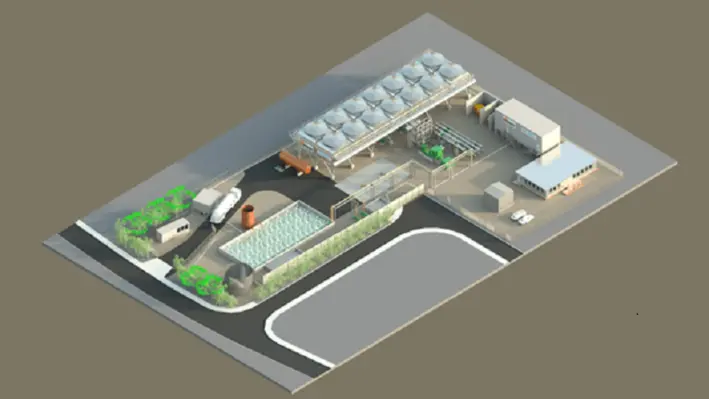
 Exergy International and Geothermal Engineering Ltd. (GEL) have signed a contract for the supply of a 3MWe gross capacity Organic Rankine Cycle (ORC) power plant in Cornwall.
Exergy International and Geothermal Engineering Ltd. (GEL) have signed a contract for the supply of a 3MWe gross capacity Organic Rankine Cycle (ORC) power plant in Cornwall.
The United Downs project represents the first integrated deep geothermal project in the UK, poised to produce 3MWe of baseload power and up to 10MWth of zero-carbon heat for the large housing development at Langarth Garden Village.
The turnkey EPC contract awarded to Exergy covers the design and engineering to the ORC system, the manufacturing of the equipment and the overall build of the power plant. As the system will be a closed loop cycle, the plant will not release any vapour into the atmosphere and will boast a small footprint with a minimal visual impact.
The system will be delivered over 18 months, with the commissioning process expected by late 2024. Once in operation, the installation is predicted to save more than 6,500 tonnes of CO2 emissions per year.
Luca Pozzoni, General Manager of Exergy International, said, “We are excited to embark on this journey with GEL. The United Downs project will be a milestone in the development of the geothermal industry in the UK and will give us the valuable opportunity to contribute with our technology and expertise to kick-starting geothermal power generation in the country.”
CEO of GEL, Ryan Law, commented, “Geothermal heat is an untapped renewable resource with the potential to provide huge amounts of energy-efficient and carbon-free electricity and heat. Exergy is well known globally for their competence in the binary geothermal power sector and we are very pleased to be working with them on this landmark project in Cornwall.”
The United Downs Deep Geothermal Power project will be home to the first deep geothermal power plant in the UK. Two directional wells have already successfully been drilled for purpose, with production well being measured to a depth of 5,275 m – the deepest onshore well in the UK – and the injection well to 2,939 m.
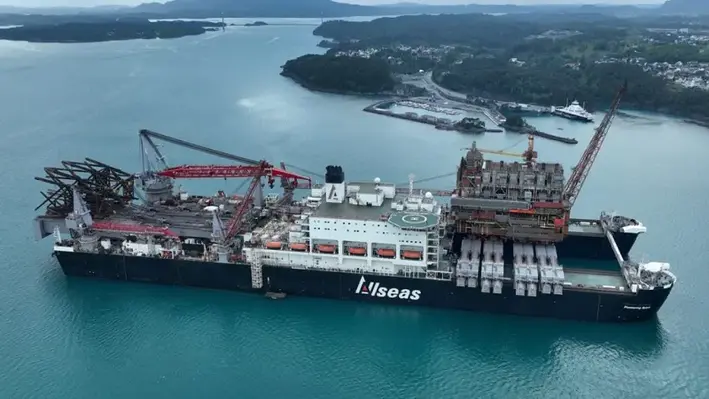

Allseas has awarded Modern American Recycling Services Europe (MARS) with the contract for project management and engineering, receipt with load-in assistance, dismantling and disposal of EnQuest’s Heather Alpha topsides.
The contract was announced on MARS’ social media platforms, and will provide the chance for the company to participate in the decommissioning of the 13,000 t topsides.
As part of the project, EnQuest will make use of Allseas’ Pioneering Spirit, a 48,000t offshore construction vessel that is designed for single-lift installation and removal of offshore platforms as well as the installation of record-weight pipelines. The ship has proven its ability to lift entire topsides of up to 48,000 t and jackets up to 20,000 t in a single piece.
The vessel will be used to remove the Heather topsides in a single lift operation. Preparations for the lift will begin next year, with the lift itself scheduled for 2025.
Following this work, in subsequent years, M.A.R.S. will recycle the platform in compliance with international, national and local rules and regulations.
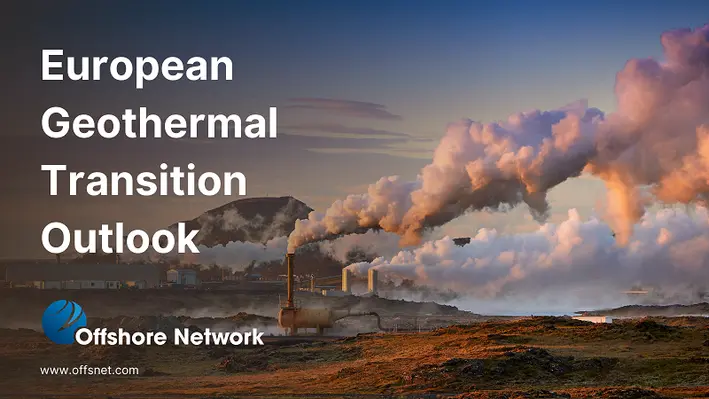
 As operators are racing to keep their heads above water as the energy transition continues to grow in momentum, instability in energy security is adding fuel to the fire and putting Europe’s energy market in jeopardy. Following the turbulent oil market over the past three years and the sanctions issued against Russia, heads are beginning to turn to geothermal to meet the rising demand for heating systems across the continent.
As operators are racing to keep their heads above water as the energy transition continues to grow in momentum, instability in energy security is adding fuel to the fire and putting Europe’s energy market in jeopardy. Following the turbulent oil market over the past three years and the sanctions issued against Russia, heads are beginning to turn to geothermal to meet the rising demand for heating systems across the continent.
Scaling geothermal heating sources in Europe could fundamentally provide not only a big stepping stone for meeting environmental targets, but also implement a more established level of energy security regionally. For the first time, policymakers are integrating geothermal movements into frameworks and governments across the continent are increasing funding for pilot projects.
The geothermal scene is hotting up, however, a number of challenges are still holding the industry back from reaching its full potential. High financial barriers appear too big to scale with the current resources available, with international players hesitant to invest in the European market. Collaboration between geothermal experts and the oil and gas community is key to bridging the gaps presented in the market and could be the key component to utilising geothermal energy to ensure energy security.
Read Offshore Network’s full report here to understand the current state of play within the European geothermal industry and hear from experts as they share their insights into how the market can receive the boost it needs to ensure regional environmental targets are met and that energy security is assured.
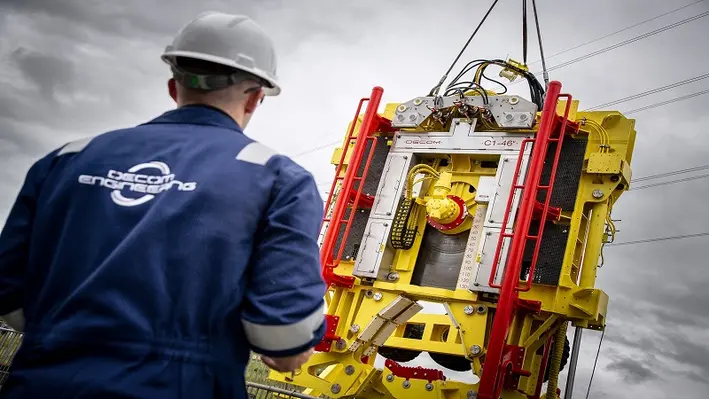

Decom Engineering (Decom) has invested more than UK£1mn to develop its largest chopsaw to date.
The C1-46 Chopsaw has been delivered in response to client demand for larger sized subsea pipe-cutting capability. It is designed to cut tubulars and other materials up to 46” and is able to cut a wide range of materials, including inconel alloys, duplex and concrete.
With the ability to cut in any orientation, the C1-46 is capable of multiple cuts per blade (20-100), resulting in large cost savings and increased efficiency. Blade changes are efficient, safe and the chopsaw can be supplied set up in a number of configurations and settings to suit project requirements.
It can be operated in water depths of up to 2,000 m and is currently deployed on its first project on behalf of a global energy company on a UK North Sea workscope.
The solution is able to achieve a versatile angle of deployment and an array of cuts can be completed whilst subsea or held in wet storage, without returning to the surface. The Tungsten Carbide Tipped saw, which can be operated topside or by ROV (with hot stab capability), is highly adaptable to suit challenging surroundings and varied structures.
Decom Engineering Managing Director, Sean Conway, commented, “Our commitment to research and development is a differentiator and making this significant investment to bring the C1-46 Chopsaw to market was a result of clients indicating they would welcome larger sized cutting options, as this is an area existing technologies struggle with.
“Decom are focused on supporting clients in solving their problems by asking how we can do more. This flagship product is designed for large subsea cutting operations and can cut through tough exotic materials and thick coatings with ease, while maintaining clean cuts for easy access to flush pipelines or recycle pipes.
“The saw clamps are designed to penetrate into the sea bed/sediment and to minimise the need for trenching. We are excited to see the C1-46 perform successfully on this North Sea project and we will take the lessons learned to refine and improve the product and its operational capabilities.
“Given the strong track record of success with our other models of the C1 Chopsaw we are confident that this latest version will perform well and will meet client expectations but we are always looking for ways to improve our offering.”
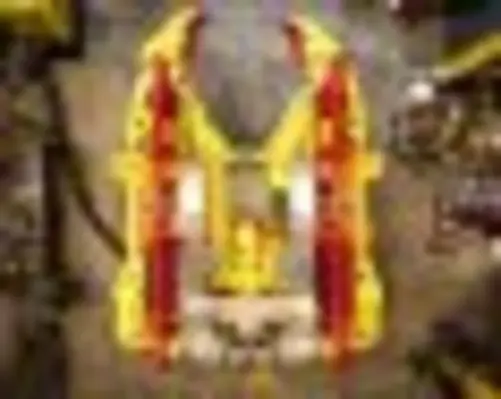
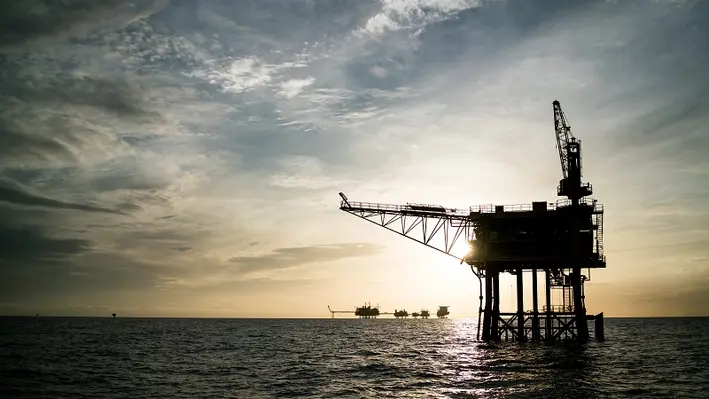

IOG plc, a UK developer and producer of indigenous offshore gas, has announced that the wireline intervention at Blythe H2 well, located in the southern North Sea, has been completed.
“We have successfully completed the wireline intervention at Blythe H2 well, which has now flowed at a maximum stabilised rate around 42 mmscf/d, slightly above our original 30-40 mmscf/d guidance,” commented Rupert Newall, CEO of IOG. “Production will now be managed up from 20 mmscf/d towards the maximum rate to further dewater the pipeline. The team has worked very well to identify the issue and remediate it safely and efficiently. The significant improvement in our operating team performance is also demonstrated by Blythe operating efficiency increasing from 59% in 2022 to 93% over 1H23 to date.”
The company provided details on the H2 intervention operation which included:
• During well testing prior to H2 First Gas on 12 June, gas flow appeared to be choked back below expected levels by a restriction above the reservoir. Equipment was mobilised to the rig to test whether this was caused by a partially activated downhole valve,
• Over the weekend, the downhole blockage was duly verified at the expected depth. The valve was then fully opened with suitable equipment and the anticipated change in downhole pressure was observed,
• The well was handed back to the operations team in the early hours of Sunday 25 June and subsequently flowed at a maximum stabilised rate of 41.9 mmscf/d,
• Production is now initially set at 20 mmscf/d and will be steadily built up to full rate over the coming week as the Saturn Banks Pipeline System is further dewatered,
• The absence of formation water production from H2 is expected to significantly reduce aqueous liquid arrivals at Bacton, which should in turn reduce unit operating expenditure,
• The plan remains to produce from H2 only over the next few months; once water levels have re-equilibrated at the H1 location, periodic production is planned from H1 at lower rates to minimise water production.
Following the intervention, Newall remarked, “In parallel with the remediation work on H2, we have been assessing next steps for the business very carefully. Mindful of current gas market and balance sheet risks, we have decided to pause drilling activity for now in order to maximise near-term cash flow."
Page 17 of 36
Copyright © 2026 Offshore Network